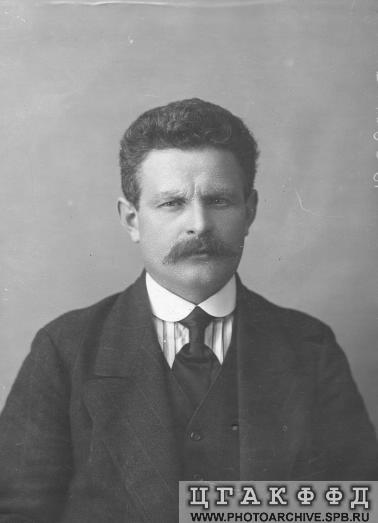<Back to Index>
- Bolshevik and Agent of the Okhrana Roman Vaslavovich Malinovsky, 1876
- Bolshevik and Agent of the Okhrana Yakov Zhitomirsky, 1800+
PAGE SPONSOR

Roman Vaslavovich Malinovsky (Russian: Рома́н Вацлавович Малино́вский) (1876 – 1918) was a prominent Russian Bolshevik politician before the revolution, while at the same time working as the best paid agent for the Okhrana. They codenamed him 'Portnoi' (the tailor).
He was a brilliant orator, tall, red haired, yellow eyed and pockmarked.
In 1899, he was convicted of theft, rape and burglary, and sentenced to jail. In 1901 - 1905 he served as a private in the Russian army.
In 1906 Malinovsky joined RSDLP and worked for the Saint Petersburg metalworkers union. In 1910, he was arrested by Okhrana but soon released: he became thus a Tsarist spy, and infiltrated the Bolshevik party. He was the best paid Tsarist agent. He got 8,000 rubles a year, 1,000 more than the Director of Imperial Police. In January 1912, he joined the Central Committee with Lenin' support at the Prague Party Conference. On October 25, 1912, he was elected at the Duma by the workers electoral college of Moscow Governorate. He led the 6 member Bolshevik group (2 of whom were Okhrana agents) and was deputy chairman of the Social Democrats in the Duma. As a secret agent, he helped send (unbeknownst to them) several important Bolsheviks (like Ordzhonikidze, Joseph Stalin and Yakov Sverdlov) into Siberian exile. When Menshevik leader Julius Martov first denounced Malinovsky as a spy in 1913, Lenin refused to believe him, and stood by Malinovsky. The accusing article was signed Ts, short for Tsederbaum, Martov's real name. Stalin threatened Martov's sister and brother in law, Lydia and Fedor Dan, saying they'd regret it if the Mensheviks denounced Malinovsky.
In November 1912 he visited Lenin in Cracow where he was urged not to unite with the Mensheviks. Malinovsky ignored this, reading a conciliatory speech in the Duma. On December 28, 1912 he attended a Central Committee meeting in Vienna. He persuaded Lenin to appoint an Okhrana agent, Chernomosov as editor of Pravda as opposed to Stalin's candidate Shaumyan who was too soft on the Mensheviks. The Tsarist regime was determined to keep the RSDRP split so conciliators were targeted.
Thanks to him, the Okhrana arrested Sergo Ordzhonikidze (April 14, 1912), Yakov Sverdlov (February 10, 1913) and Joseph Stalin (February 23, 1913). The latter was arrested at a Bolshevik fundraising ball. He hadn't wanted to go but Malinovsky persuaded him by lending him a suit and silk cravat. Malinovsky was talking to Stalin when detectives took him, even shouting he would free him. In July 1913 he betrayed a plan for Sverdlov and Stalin to escape, warning the police chief in Turukhansk. By now he was the only Bolshevik leader not in foreign or Siberian exile.
On May 8, 1914 he was forced to resign from the Duma. By now he was an alcoholic drinking vodka from teapots. His real identity was unveiled by his ex-mistress Elena Troyanovskaya, and he went into exile in Germany. When World War I broke out, he was interned into a POW camp by the Germans. Lenin, still standing by him, sent him clothes. He said: "If he is a provocateur, the police gained less from it than our Party did." This refers to his strong anti Menshevism. Eventually, Lenin changed his mind: "What a swine: shooting's too good for him!"
In 1918, he tried to join the Petrograd Soviet, but Grigory Zinoviev recognized him. In November, after a brief trial, Malinovsky was executed by firing squad.
According to British historian Simon Sebag Montefiore
his successful infiltration into the Bolsheviks help fuel the paranoia
of the Soviets (and more specifically, Stalin) that eventually gave way
to the Great Terror.
Dr. Jacob (Yakov) Zhitomirsky (party alias Otsov, Okhrana aliases Andre and Daudet) was a prominent Bolshevik best known for being a secret agent of the Okhrana.
He was recruited by Okhrana in 1902, while studying at the University of Berlin. Zhitomirsky was active in Berlin RSPLP group, reporting its activities to the Russian police, up to 1907 when Bolsheviks were expelled from Berlin by German authorities and Zhitomirsky moved to Paris.
He attended the 5th RSDLP Congress in London.
In 1908 he was given twenty 500 ruble notes by the people, involved in the 1907 Tiflis bank robbery. Unable to exchange notes, he passed this money to the vice director of the Russian Department of Police Vissarionov, during his visit to Paris.
During World War I he served as a doctor with the Russian Expeditionary Force in France and reported about revolutionary propaganda among the Russian troops.